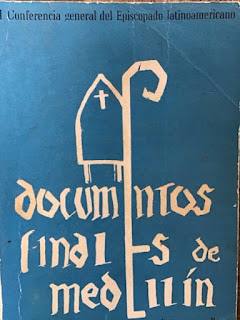The
Zapatista rebellion against NAFTA January 1, 1994 hit me front and center during our recent
visit to family in Chiapas, Mexico. I
was also reminded of the role of the local Catholic Church struggling to bring
justice and peace to the area. History records that the Pope in Rome significantly
challenged these efforts in Chiapas ever since the ‘conquista.’ This article is a glimpse at the struggles of
Bishops Samuel Ruiz (1924 - 2011) and Bartolomé de Las Casas (1484 - 1566), both
considered as spokes persons for the indigenous people.
The
Vatican II document on the Church, Lumen
Gentium presents the faithful with a dilemma. In the first chapter it states that the people
of God are inspired by the Holy Spirit (The
Spirit dwells in the church and in the hearts of the faithful as in a temple.)
yet in the second chapter it insists that the people of God must obey the pope.
(…the sacred primacy of the Roman Pontiff
and of his infallible teaching authority, this sacred Synod again proposes to
be firmly believed by all the faithful. … the successor of Peter, the Vicar of Christ).
Bartolomé de Las Casas, an early Bishop of
Chiapas, was known as a defender of the indigenous people of America. He was a secular priest and a landowner in
Cuba. After a personal awakening he became an associate of the Dominican
community in Hispanola that in 1511 condemned the Spanish ‘Conquista’ saying
the ‘conquistadores’ had no legal right to subject the indigenous people to
slavery and to take their land and treasure.
The response from the Church and Spain was swift and negative. Las Casas joined the Dominicans in 1522.
Las Casas challenged fellow Dominican friar
Francisco de Vittoria who claimed that the Spanish had the right to wage war on
the indigenous if they seemed to reject the Spanish quest for treasure and
land.
Popes of the ‘conquista’ refused to comprehend
what Las Casas reported and failed to stop the violation of indigenous humanity
in the Americas. Following de Vittoria,
they supported a theology of colonialism as a path to salvation for all. From experience Las Casas saw it as hell
itself for all.
 |
| Bishops Vera Lopez (left) and Ruiz (right) |
The
controversial Bishop Samuel Ruiz García was appointed Bishop of the diocese
of San Cristobal de Las Casas in 1959 by Pope John XXIII. He was a delegate to Vatican II (1962 – 1965)
and participated in the Latin American Bishops conference in Medellin, Columbia
in 1968. Vatican II emphasized peace
through justice and the importance of recognizing the events of history as a
determinant of understanding Faith (‘the signs of the times’). Medellin proclaimed the ‘preferential option
for the poor’. The Vatican II – Medellin
theology of Don Samuel was reminiscent of that of his predecessor Bartolomé de Las Casas the namesake of the diocese.
Although
the Medellin conference recognized the structural violence to the poor by the
world economic system it rejected the option for violence in the quest for
justice. Bishop Ruiz was opposed to
armed action. He agreed with the
Zapatista’s opposition to the neo-liberal trade agreement NAFTA and also their insistence
on justice for the indigenous, but he opposed violence as a means.
The colonial system of the 16th
century moved to free trade liberalism then to free trade neo-liberalism of the
20th and 21st centuries.
All of these systems weighted the scale in favor of the wealthy and
powerful and were a catalyst for war.
Since Don Samuel opposed the economic and
political system that oppressed the poor; he generated powerful enemies
including the Vatican. Auxiliary Bishop
Raul Vera Lopez, O.P. who was strong supporter and collaborator of Bishop Ruiz was
considered to be Don Samuel’s successor and would continue his work when Ruiz
retired. However when Bishop Ruiz
retired, Rome sent Vera Lopez to another diocese.
The ‘low
intensity war’ of the recent past has moved to a fragile tranquility with some armed violence but still without
justice for the indigenous people. The
resistant Mayan communities in Chiapas continue dialogue with the world but have
maintained their culture, languages, and in some cases, their autonomy. Pastor
of St. Dominic’s Parish in San Cristobal de Las Casas, Fray Pablo Iribarren,
O.P. wrote,
My
respect and admiration go out for the people of Tzotzil, especially those of
San Juan Chamula. Their history is a
synthesis of the expression resistance’,
resistance to diverse external pressures in their existence as a community – resistance to military conquest,
resistance to religious and cultural imposition, resistance to structural changes
social, political and religious. (Pablo
Iribarren, O.P. Mision Chamula, Chiapas, 2016, p. 8.)
The
importance of the indigenous people at the present time cannot be
overstated. The world needs their
missionaries to teach us reverence and care for the environment.




No comments:
Post a Comment